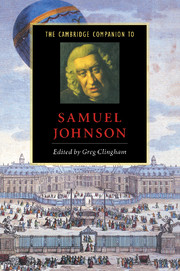Book contents
- Frontmatter
- Introduction
- 1 Extraordinarily ordinary
- 2 Johnson and the arts of conversation
- 3 Johnson's poetry
- 4 Johnson, the essay, and The Rambler
- 5 Johnson and the condition of women
- 6 Johnson's Dictionary
- 7 Johnson's politics
- 8 Johnson and imperialism
- 9 The skepticism of Johnson's Rasselas
- 10 Shakespeare
- 11 Life and literature in Johnson's Lives of the Poets
- 12 Johnson's Christian thought
- 13 “From China to Peru”
- 14 “Letters about nothing”
- 15 Johnson's critical reception
- Further reading
- Index
11 - Life and literature in Johnson's Lives of the Poets
Published online by Cambridge University Press: 28 May 2006
- Frontmatter
- Introduction
- 1 Extraordinarily ordinary
- 2 Johnson and the arts of conversation
- 3 Johnson's poetry
- 4 Johnson, the essay, and The Rambler
- 5 Johnson and the condition of women
- 6 Johnson's Dictionary
- 7 Johnson's politics
- 8 Johnson and imperialism
- 9 The skepticism of Johnson's Rasselas
- 10 Shakespeare
- 11 Life and literature in Johnson's Lives of the Poets
- 12 Johnson's Christian thought
- 13 “From China to Peru”
- 14 “Letters about nothing”
- 15 Johnson's critical reception
- Further reading
- Index
Summary
When Matthew Arnold formulated his ideal of liberal education, he turned not to Coleridge or Hazlitt or De Quincey, or even to Keats or Wordsworth or Tennyson, but to Johnson's Lives of the Poets. In his Six Chief Lives from Johnson's “Lives of the Poets” (1878) Arnold designated Johnson's lives of Milton, Dryden, Pope, Addison, Swift, and Gray as points de repère - “points which stand as so many natural centres, and by returning to which we can always find our way again.” These critical biographies covered the period from the birth of Milton in 1608 to the death of Gray in 1771, a crucial century and a half in English literature; and although there were significant critical disagreements of judgment between Arnold and Johnson, when it came to an education in literary history, biography, and criticism Arnold saw the Lives of the Poets as offering a “compendious story of a whole important age in English literature, told by a great man, and in a performance which is itself a piece of English literature of the first class” (p. 362).
- Type
- Chapter
- Information
- The Cambridge Companion to Samuel Johnson , pp. 161 - 191Publisher: Cambridge University PressPrint publication year: 1997
- 3
- Cited by

